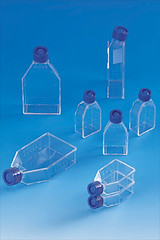 Here is the preliminary programme for the workshop “Contemporary biomedical science and medical technology as a challenge to museums” (15th biannual meeting of the European Association of Museums for the History of Medical Sciences), to be held in Copenhagen, 16-18 September, 2010.
Here is the preliminary programme for the workshop “Contemporary biomedical science and medical technology as a challenge to museums” (15th biannual meeting of the European Association of Museums for the History of Medical Sciences), to be held in Copenhagen, 16-18 September, 2010.
The presentations below have been selected by the programme committee (Ken Arnold, Wellcome Collection, London; Robert Bud, Science Museum, London; Judy Chelnick, National Museum of American History, Washington DC; Mieneke te Hennepe, Boerhaave Museum, Leiden; and Thomas Söderqvist, Medical Museion, Copenhagen) in dialogue with the secretary of the EAMHMS (James Edmonson, Dittrick Museum, Cleveland).
Preliminary programme:
Sniff Andersen Nexø (Dept of History, University of Copenhagen):
TBA
Suzanne Anker (School of Visual Arts , New York):
“Inside/Out: Historical Specimens through a 21st Century Lens”
Kerstin Hulter Åsberg (Dept of Neuroscience, Uppsala University):
“Uppsala Biomedical Center: A Mirror and a Museum of Modern Medical History”
Yin Chung Au (Planning and Coordination Centre for Developing Science Communication Industry, National Science Council, Taiwan):
“Seeing is communicating: Possible roles of med-art in communicating contemporary scientific process with the general public in digital age
Adam Bencard (Medical Museion, University of Copenhagen):
“The molecular body on display”
Caitlin Berrigan (independent artist):
“Improvising Glycoproteins: A case study in artistic virology”
Danny Birchall (Wellcome Collection, London):
“Medical London and the photography of everyday medicine”
Silvia Casini (Observa – Science in Society, Venice):
“Curating the Biomedical Archive-fever”
Judy M. Chelnick (Division of Medicine and Science, National Museum of American History):
“The Challenges of Collecting Contemporary Medical Science and Technology at the Smithsonian Institution”
Roger Cooter (Wellcome Trust Centre for the History of Medicine, UCL) and Claudia Stein (Dept of History, University of Warwick):’
“Visual Things and Universal Meanings: Aids Posters, the Politics of Globalization, and History”
Nina Czegledy (Senior Fellow, KMDI, University of Toronto):’
“At the Intersection of Art and Medicine”
John Durant (MIT Museum):
“Prospects for International Collaboration in Collecting Contemporary Science and Technology”
Joanna Ebenstein (The Observatory, New York):
“The Private, Curious, and Niche Collection: What They can Teach Us”
Jim Edmonson (Dittrick Museum, Case Western Reserve University):
“Collection plan for endoscopy, documenting the period 1996-2010”
Jim Garretts (Thackray Museum, Leeds):
“Bringing William Astbury into the 21st Century: the Thackray Museum and the Astbury Centre for Structural Molecular Biology in partnership”
Victoria Höög (Dept of Philosophy and History of Science, University of Lund):
“The Optic Invasion of the Body. Naturalism as an Interface between Epistemic Standards in Biomedical Images and the Medical Museums”
Karen Ingham (School of Research and Postgraduate Studies, Swansea Metropolitan University):
“Medicine, Materiality and Museology: collaborations between art, medicine and the museum space”
Ramunas Kondratas (independent scholar; formerly Division of Medicine and Science, National Museum of American History):
“The Use of New Media in Medical History Museums”
Lucy Lyons (Medical Museion, University of Copenhagen):
“What am I looking at?”
Robert Martensen (Office of History & Museum, NIH):
“Integrating the Physical and the Virtual in Exhibitions, Archives, and Historical Research at the National Institutes of Health”
Stella Mason (independent scholar):
“Contemporary Medicine in Museums: What do our visitors think of our efforts?”
René Mornex and Wendy Atkinson (Hospices Civils de Lyon, Université Claude Bernard Lyon1):
“A large health museum in Lyon”
Jan Eric Olsén (Dept of History of Ideas, University of Lund):
“The displaced clinic: healthcare gadgets for home use”
Kim Sawchuk (Dept of Communication Studies, Concordia University):
“Bio-tourism into museums, galleries, and science centres”
Thomas Schnalke (Berliner Medizinhistorisches Museum):
“Dissolving matters: the end of all medical museums’ games?”
Morten Skydsgaard (Steno Museum of the History of Science, Aarhus University):
“Boundaries of the Body and the Guest: Art as a facilitator in the exhibition The Incomplete Child”
Sébastien Soubiran (Jardin des Science, Université de Strasbourg):
“Which scientific world would we like to depict in a 21st century university museum?”
Yves Thomas (Polytech Nantes) and Catherine Cuenca (Université de Nantes and Musée des Arts et Métiers in Paris):
”Multimedia contributions to contemporary medical museology”
Maie Toomsalu (Medical Collections, University of Tartu):
“Visitor studies at the Medical Collections of University of Tartu”
Henrik Treimo (Norsk Teknisk Museum, Oslo):
”Invisible World: Visualising the invisible parts of the body”
Alex Tyrell (Science Museum, London):
“New voices: involving your audience in content creation”
Nurin Veis (Museum Victoria, Melbourne):
“How do we tell the story of the cochlear implant?”
Final titles will be announced after the revised/extended abstracts have been submitted by Monday, 2 August.
The workshop starts Thursday, 16 September at noon and ends Saturday, 18 September at 5 pm.
Sessions will be held at Medical Museion and in the Danish Museum of Art and Design. The two meeting venues are situated close to each other in central Copenhagen.
The format of the workshop is informal. In order to focus on discussion and intellectual exchange, each accepted abstract will get a maximum of 8 (eight) minutes for oral presentation, followed by a longer discussion. Extended abstracts (2-5 pages) will be distributed to all registered participants in late August.
The workshop is open to registered participants only. Due to space limitations, we have to impose a first register/first serve policy for attendance.
For details about registration, bank transfer, hotel bookings, special needs, etc., see http://www.mm.ku.dk/sker/eamhms.aspx.
For inquiries about the academic programme, please contact the chair of the programme committee, professor Thomas Söderqvist, Medical Museion, ths@sund.ku.dk or +45 2875 3801.
For inquiries about the venue, accommodation, registration, bank transfer etc., please contact the secretary of the local organizing committee, Ms Anni Harris, anniha@sund.ku.dk or +45 3532 3800.
The workshop is organized by Medical Museion, University of Copenhagen (www.mm.ku.dk; www.corporeality.net/museion).


